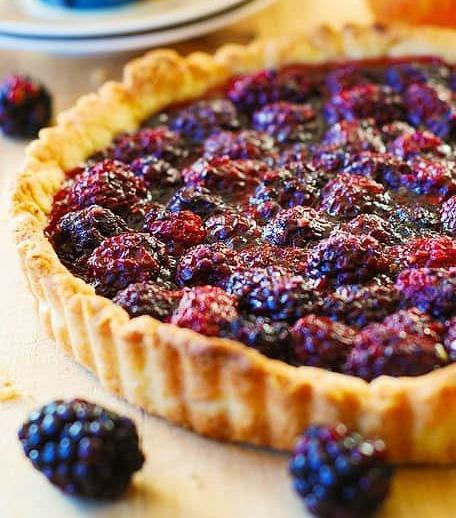Click the tartan to view its entry in The Scottish Registers of Tartans which includes registration details, restrictions, and registrant information.
Unregistered tartans may link to one of the web's online design environments for similar information.
For any questions about reproduction of designs or weaving of these tartans, please contact the registrant directly or via this website.
Blackberry Day
"O, blackberry tart, with berries as big as your thumb, purple and black, and thick with juice, and a crust to endear them that will go to cream in your mouth, and both passing down with such a taste that will make you close your eyes and wish you might live forever in the wideness of that rich moment."
~ How Green Was My Valley, Richard Llewellyn, 1939
This is purple prose you can almost taste. Deep violet tones and berry-rich hues spill across this tartan, evoking bowls of cream and every shade of bramble fruit. The sett feels luscious, layered, and ripe with flavor.
Blackberries, brambles, bumble-kites, brummel, bly, brameberry, scaldhead, brambleberry—whatever you call them, September 12th marks Blackberry Day, the traditional moment in the English Midlands when the fruit reaches perfect ripeness. Miss the harvest, and folklore warns you not to delay too long. By October 11th—Old Michaelmas Day, sometimes called Devil’s Spit Day—the berries are said to turn bitter and spoiled.
Legend tells that when St. Michael cast Lucifer out of heaven, the fallen angel landed in a blackberry bush. In his fury he scorched the fruit with his fiery breath, stamped upon it, spat on it, and left it cursed. From that day on, the berries were no longer fit to eat after Michaelmas. As a result, the last of the season’s fruit often found its way into a Michaelmas blackberry pie, a farewell to the year’s sweet bounty.
This tartan pays tribute to that rich tradition with thread colours named “Blackberry,” “Blackcurrant,” and “Honey Flower.” Woven together, they create a feast for the eyes—scrumptious, decadent, and delightfully purple. 💜 🖤 🤍 💜 🫐 🫐 🫐 😈
"Blackberries are red when they're green."
~ Traditional
Wild blackberries have many special cultivars and descendants that are equally delicious!
'Marion' (marketed as "marionberry") is an important cultivar that was selected from seedlings from a cross between 'Chehalem' and 'Olallie' (commonly called "Olallieberry") berries. 'Olallie' in turn is a cross between loganberry and youngberry.
Folklore in the United Kingdom says that blackberries should not be picked after Old Michaelmas Day (11 October) as the devil (or sometimes the Púca, a Celtic spirit said to be a shape-changer which may help or harass rural or marine communities) has made them unfit to eat by stepping, spitting or fouling on them.
There is some rationale behind heeding this legend as wetter and cooler weather often allows the fruit to become infected by various molds which give the fruit an unpleasant look and may be toxic.
This tartan, designed by Carol A.L. Martin, uses the deliciously evocative weaving colors of "Blackberry, "Blackcurrant" and "Honey Flower."
If blackberries are in season where you live, click the ripe berries for a delicious blackberry cobbler recipe from The Pioneer Woman.
And remember ... blackberry fruits are red before they are ripe, leading to the old expression that "blackberries are red when they're green".







